Physical Address
304 North Cardinal St.
Dorchester Center, MA 02124
Physical Address
304 North Cardinal St.
Dorchester Center, MA 02124
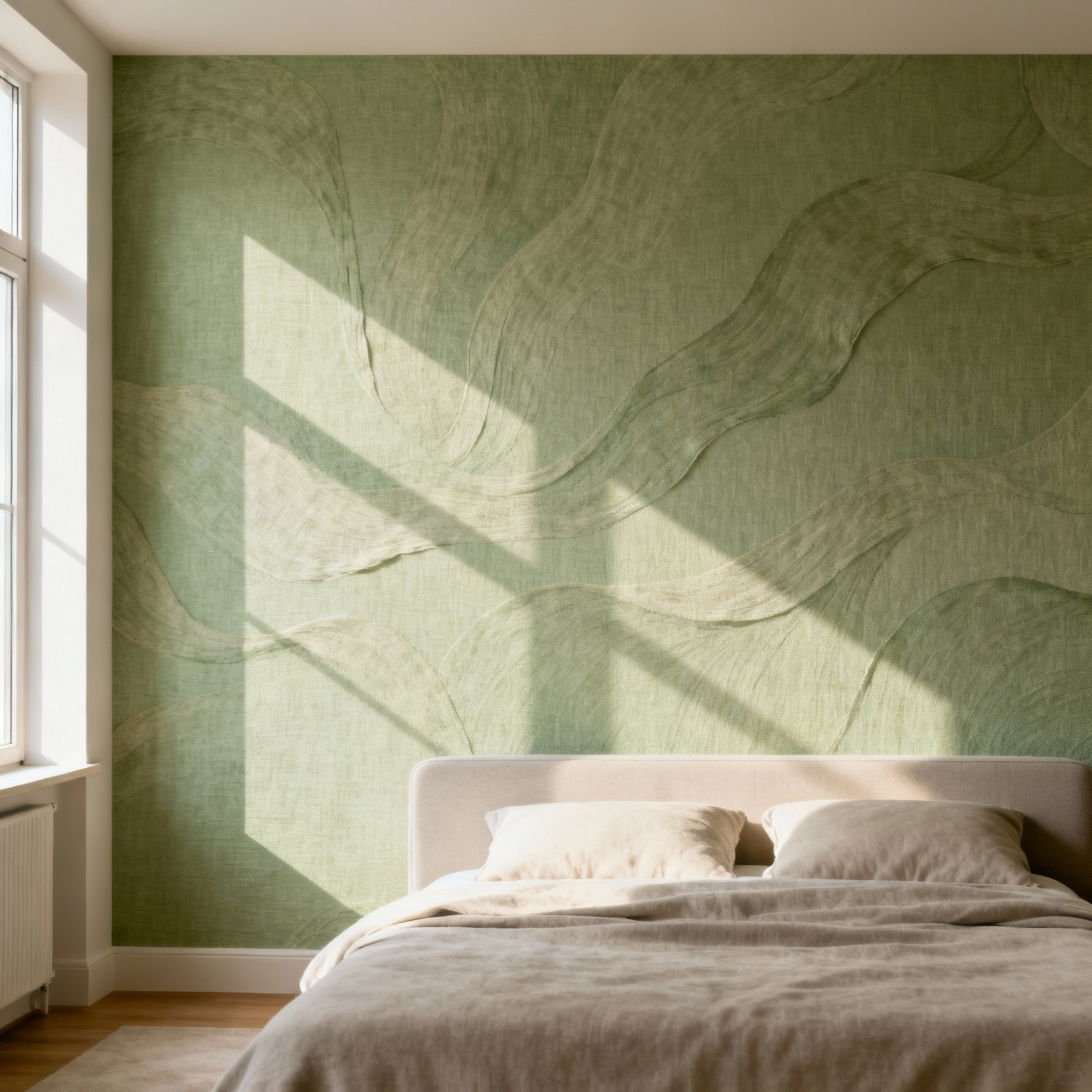
Discover 20 serene master bedroom wallpaper ideas to create a mindful sanctuary. Explore textures, patterns, and applications that support well-being and inner peace.
To shape a personal sanctuary is, at its heart, an act of self-revelation—every choice reflects not just an aesthetic leaning, but deeper beliefs about how a life of peace should be lived. The most compelling private spaces aren’t decorated; they are authored. They tell the quiet story of your inner landscape, your need for calm, and your understanding of how beauty supports daily well-being. These 20 principles and ideas are designed to move beyond fleeting trends, helping you find the authentic expression that will turn your master bedroom into a true refuge.
Before we even consider a single pattern, we begin with intention. The journey to a serene master bedroom starts with a philosophical understanding of how the surfaces that envelop us can either quiet the mind or contribute to its restlessness. Here, we explore the foundational principles that transform a simple wall covering into a conduit for profound tranquility.
Every pattern carries a subtle energy, a rhythm that can either soothe or agitate the spirit. A master bedroom should be a place where the energy is fluid and gentle, allowing the mind to settle. Organic, flowing motifs—think soft botanicals or watercolor washes—encourage a sense of ease, while overly sharp or chaotic patterns can introduce a disruptive visual static. The goal is to choose a design that your eyes can rest upon, one that feels like a gentle, visual hum in the background of your consciousness.
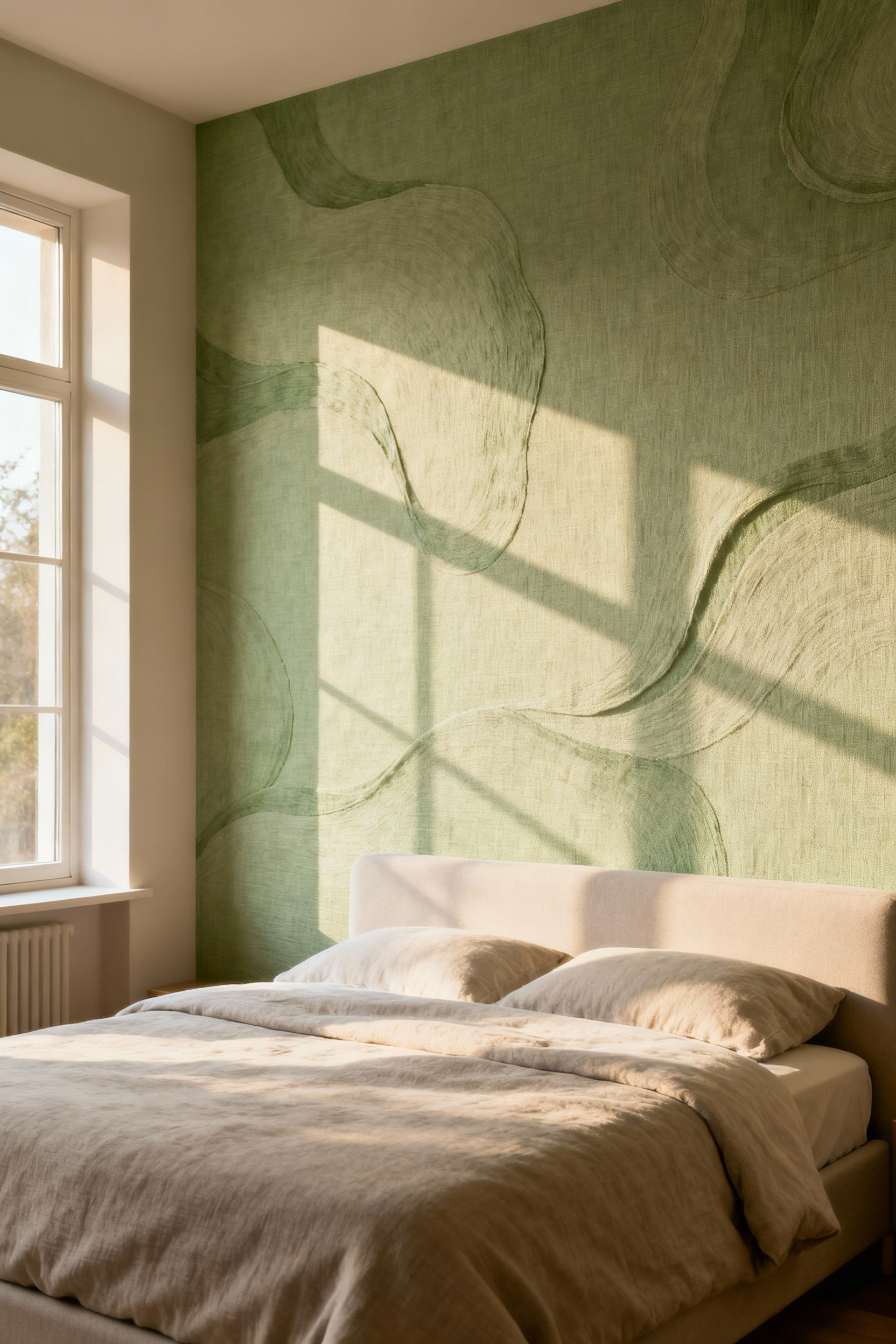
When you’re exploring different bedroom wallpaper ideas master suites can benefit from, think less about making a statement and more about supporting a state of being. Does this pattern encourage your breath to deepen? In my practice designing meditation spaces, I’ve found that the right pattern can significantly reduce the mind’s tendency toward “visual noise.” It becomes a quiet anchor, allowing you to turn your focus inward. A finely detailed vine might encourage a slow, meditative gaze, while a subtle, repeating motif can provide a sense of stability without demanding attention. This isn’t just decoration; it’s crafting a visual melody for your inner peace.
We experience our environment through more than just our eyes. The sense of touch is profoundly grounding, and bringing texture to your walls introduces a palpable layer of comfort. A space meant for rest engages all the senses, and the feeling of a surface can speak directly to our nervous system. Smooth, cool silk suggests refinement and calm, while the natural, fibrous touch of grasscloth can connect us to the earth, making us feel rooted and secure.
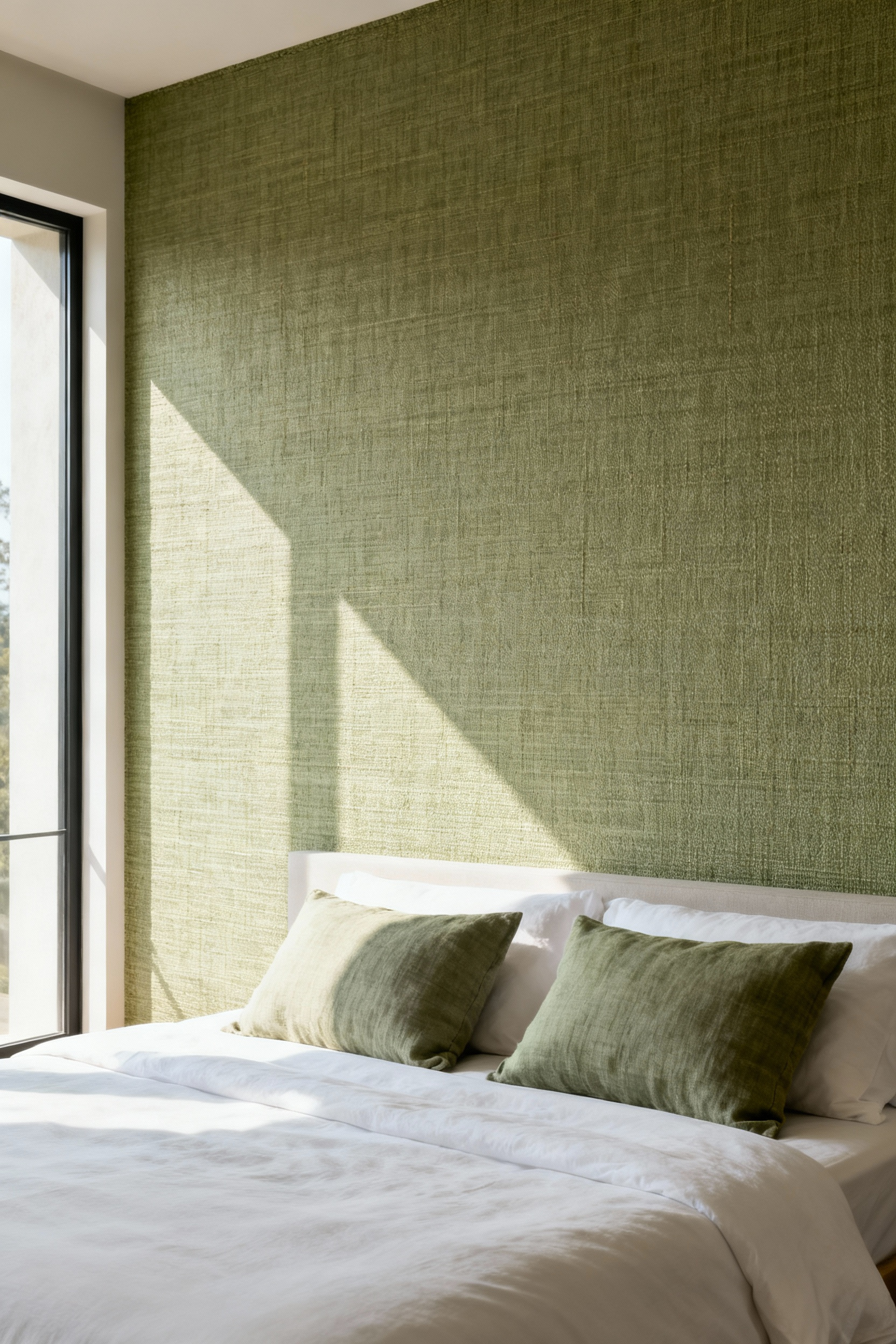
Consider materials that invite a gentle touch—a soft, woven paper, a subtly embossed vinyl, or a paper that mimics raw linen. These textures turn walls into a comforting embrace, adding a dimension of warmth that flat paint can never replicate. Textured papers also have a wonderful way of absorbing sound, subtly hushing the room and creating a quieter, more contained environment for sleep. You are creating a space that doesn’t just look peaceful but feels that way to your very core.
Our intrinsic connection to the natural world—what we call biophilia—is one of the most powerful tools for creating a healing space. Inviting nature’s patterns, colors, and rhythms into the bedroom is a direct way to lower stress and foster a sense of well-being. This is about more than just a floral print; it’s about capturing the essence of a serene landscape within your four walls. Think of wallpapers that evoke the soft mist of a forest, the gentle undulation of water, or the delicate silhouette of leaves against a morning sky.
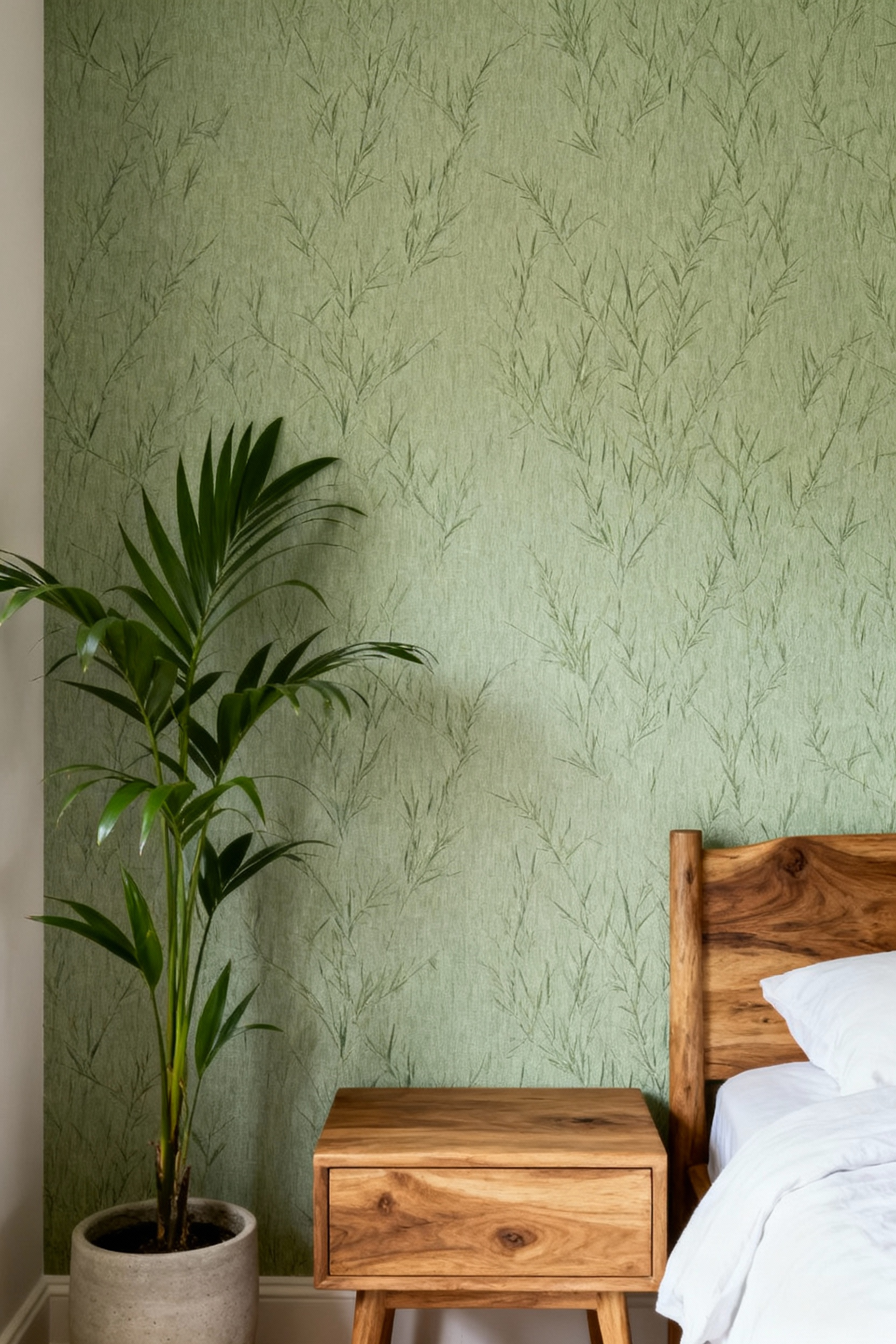
A mural depicting a serene, misty mountain range can dissolve the boundaries of the room, making it feel more expansive and connected to the world outside. For a more understated approach, a pattern with scattered ferns or a minimalist leaf motif provides a subtle, constant reminder of growth and life. By surrounding yourself with these echoes of nature, you create a restorative cocoon that supports your body’s natural rhythms of rest and renewal.
True serenity often whispers; it rarely shouts. The principle of subtlety teaches us that a rich, layered space can be created without overwhelming the senses. In the master bedroom, our aim is to cultivate an environment that invites calm introspection, free from visual clutter. Tone-on-tone patterns, where the design is just a shade or two different from the background, are masterful at creating depth without demanding your attention.
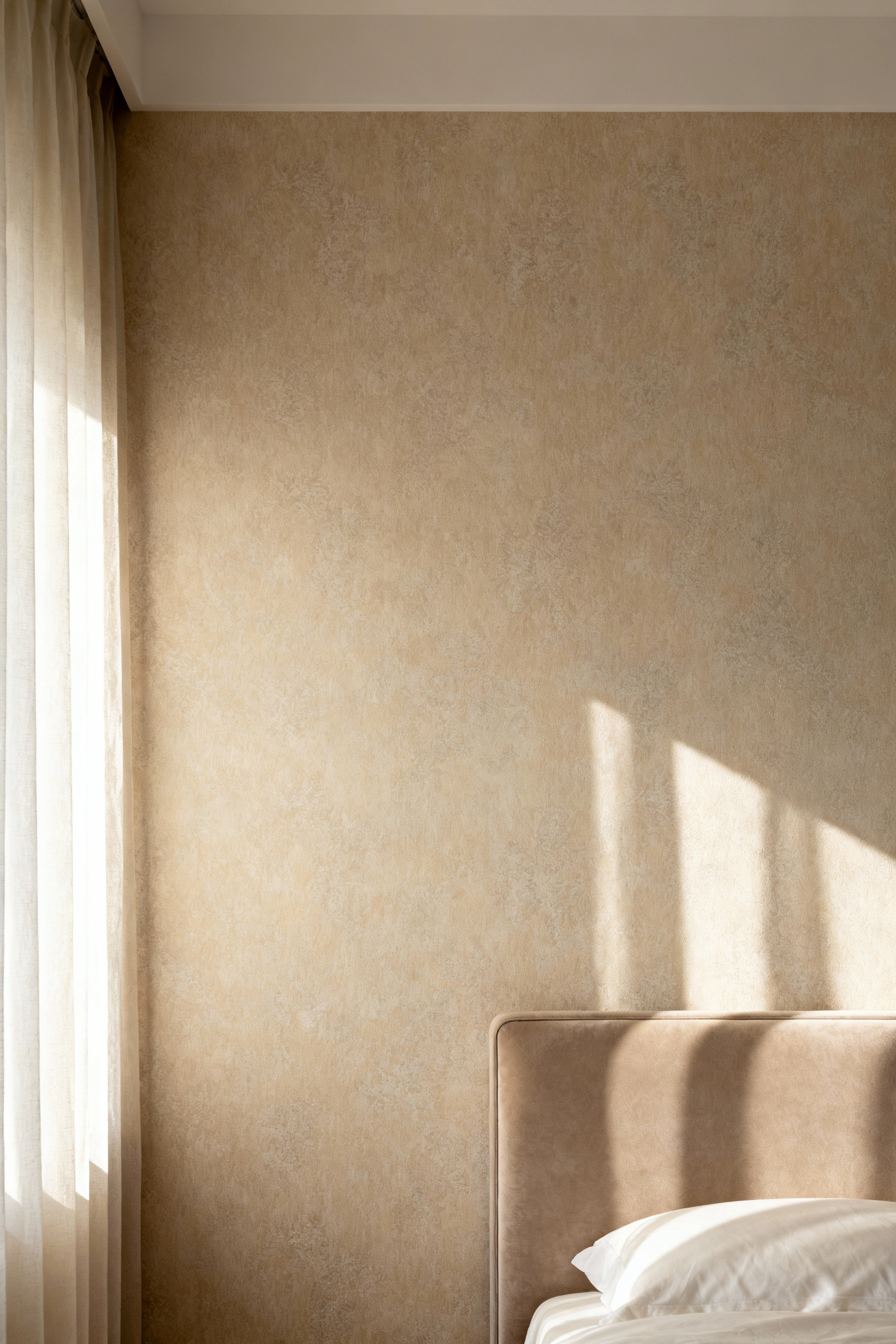
These are the wallpapers that reward a closer look but recede into a graceful, cohesive texture from afar. A delicate damask in a muted putty hue, barely discernible stripes in shades of cream, or a woven pattern where light and shadow create the design are all beautiful examples. This approach ensures your walls feel interesting and sophisticated, yet serve as a quiet, unobtrusive backdrop for your life. It’s a design choice that feels timeless, supporting your peace of mind now and for years to come.
Now we move from the universal principles of serenity to something more intimate: the expression of you. A true sanctuary is not a generic hotel room; it is a space that reflects your personal story, your journey, and your deepest aspirations. This is where design becomes a form of self-portraiture.
Your bedroom walls have the potential to be so much more than a backdrop; they can be a canvas for your personal narrative. What story do you want to be surrounded by as you rest and recharge? Choosing a wallpaper becomes an act of weaving your memories, travels, and dreams into the very fabric of your room. Perhaps a delicate Chinoiserie reminds you of a cherished trip, or an abstract pattern in watery blues evokes the calm of a favorite coastline.
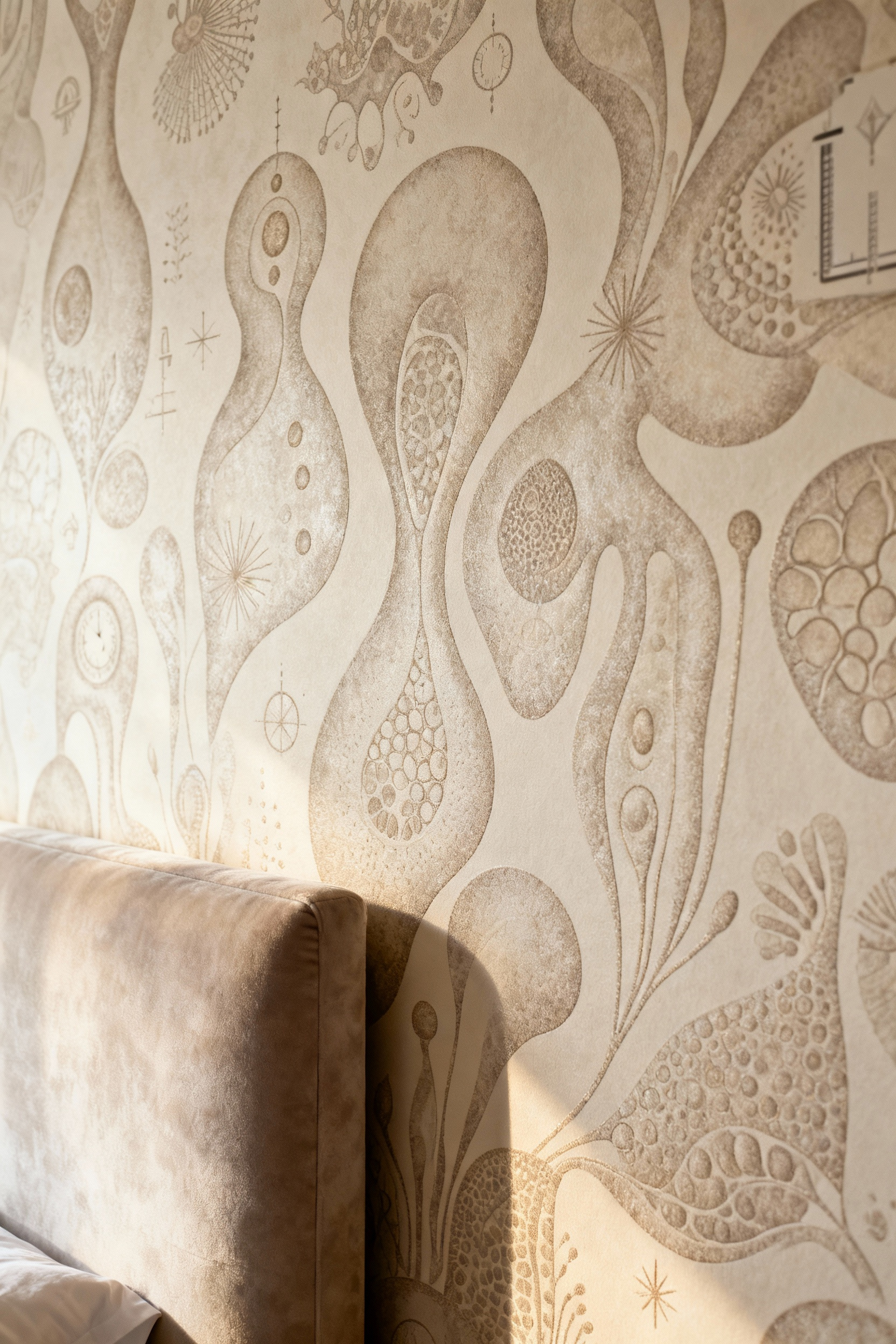
Here’s what’s interesting—what I often suggest to clients is to think about a place or a feeling that represents ultimate peace to them. One person I worked with chose a wallpaper with a subtle birch tree motif because it brought back vivid, joyful memories of her childhood home. Now, every morning she wakes up enveloped by a gentle reminder of that security and happiness. By infusing your space with these personal symbols, you create a profound sense of belonging. The room becomes more than just a bedroom; it becomes a home for your spirit.
Let’s deepen our connection to the space by exploring materials that engage more than just the eye. The feel of a surface under our fingertips, the way it absorbs sound, the very integrity of its composition—these are the subtle qualities that create a truly enveloping and high-quality environment.
There is an honesty to materials woven from the earth. Grasscloth, with its natural fibers of sisal, jute, or hemp, brings an organic, tactile warmth into a room. Its inherent imperfections—the slight variations in weave and color—are not flaws but signs of its handmade origins, lending a unique character that mass-produced papers lack. It softens the hard lines of a room and creates a wonderfully cozy, cocooning effect that is perfect for a sleep sanctuary.
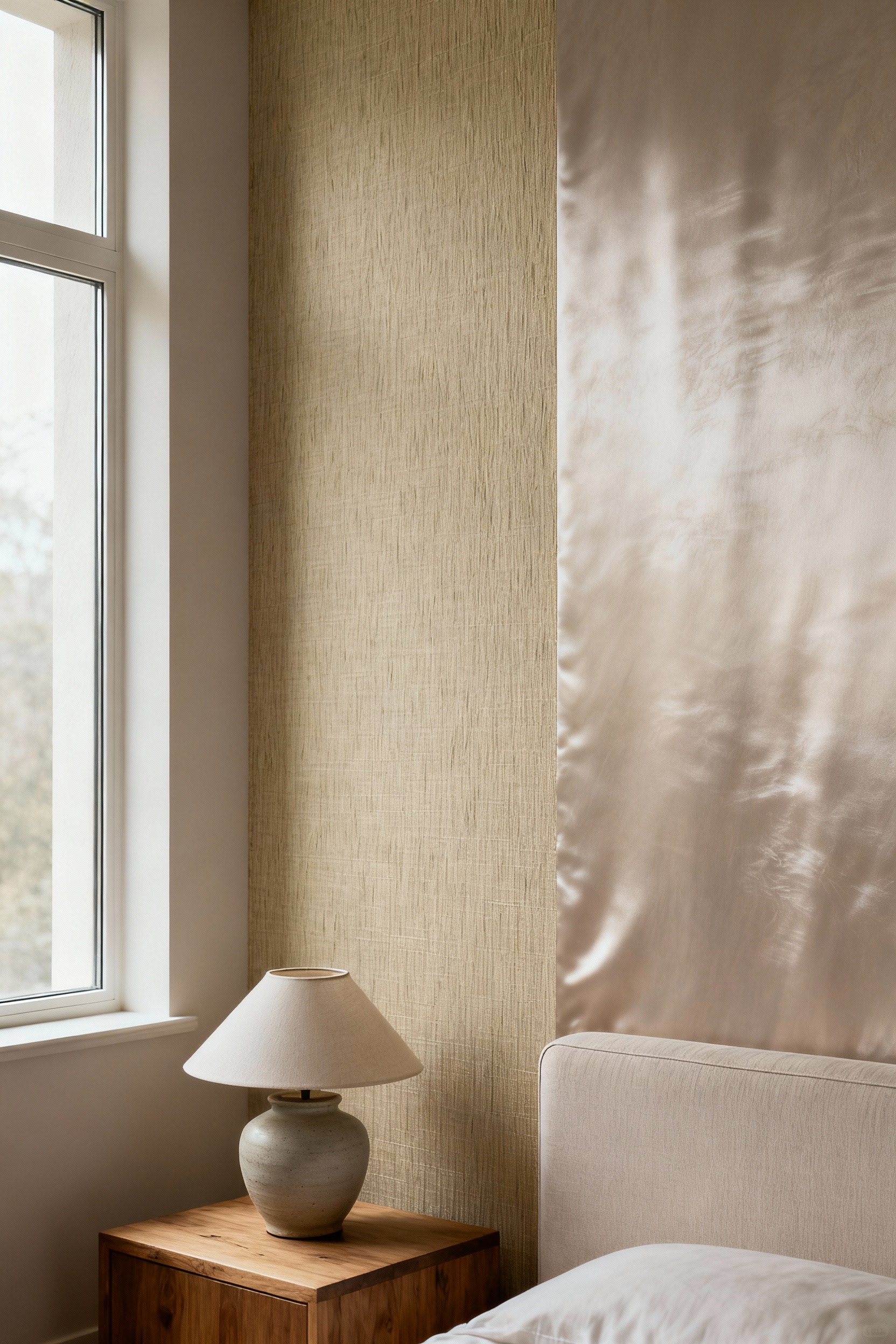
Silk, on the other hand, offers a different kind of serenity. Its refined luster catches the light in a way that feels both luxurious and ethereal, creating an impression of seamless elegance. While grasscloth feels grounding and earthy, silk feels like a gentle, shimmering embrace. In my professional experience, I’ve seen how both materials can transform a room. They possess a quiet authority and a depth that creates an immediate sense of being held and cared for by your environment. This is a level of comfort that goes far beyond the visual.
True serenity is holistic. It includes the peace of mind that comes from knowing the materials in your sanctuary were created with respect for the planet and its people. Aligning your aesthetic choices with your values brings a powerful integrity to your space. When you choose natural wallpapers—from bamboo and cork to linen—seek out those that are sustainably harvested and crafted using non-toxic, water-based inks and dyes.
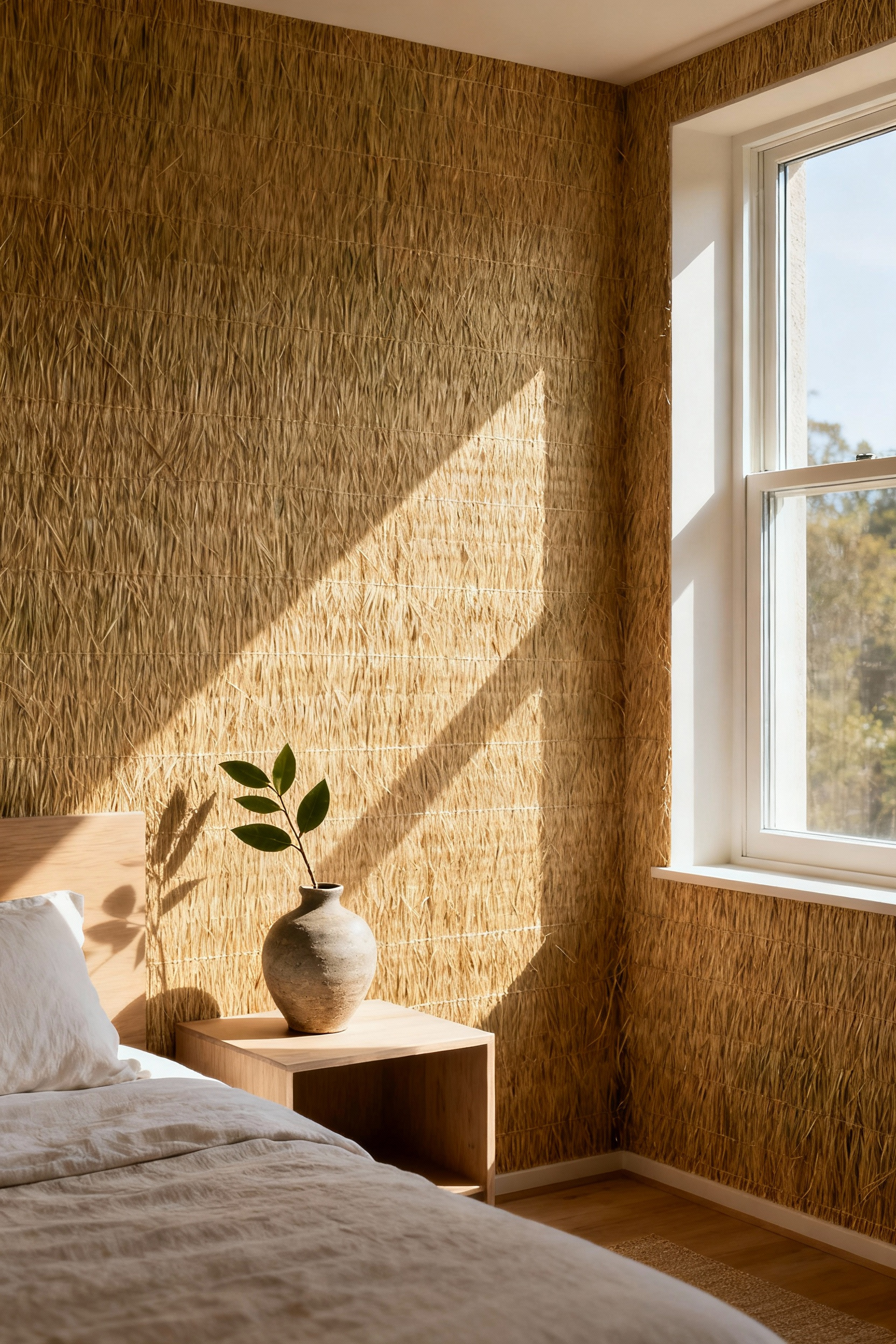
This isn’t just about environmental responsibility; it’s about your own well-being. Choosing wallpapers with low or zero VOCs (volatile organic compounds) contributes to healthier indoor air quality, which is crucial in a room where you spend a third of your life. Surrounding yourself with materials that are beautiful, natural, and ethically produced adds another, unseen layer of tranquility. Your space feels pure not just in its aesthetic, but in its very essence.
When we hear “metallic,” we often think of something flashy. But in mindful design, metallics are used for a much subtler purpose: to dance with light. A wallpaper with a soft, brushed gold or pearlescent silver thread woven through it can beautifully capture and diffuse natural light, making a room feel more spacious and alive. The effect is less about bling and more about a gentle, living glow.
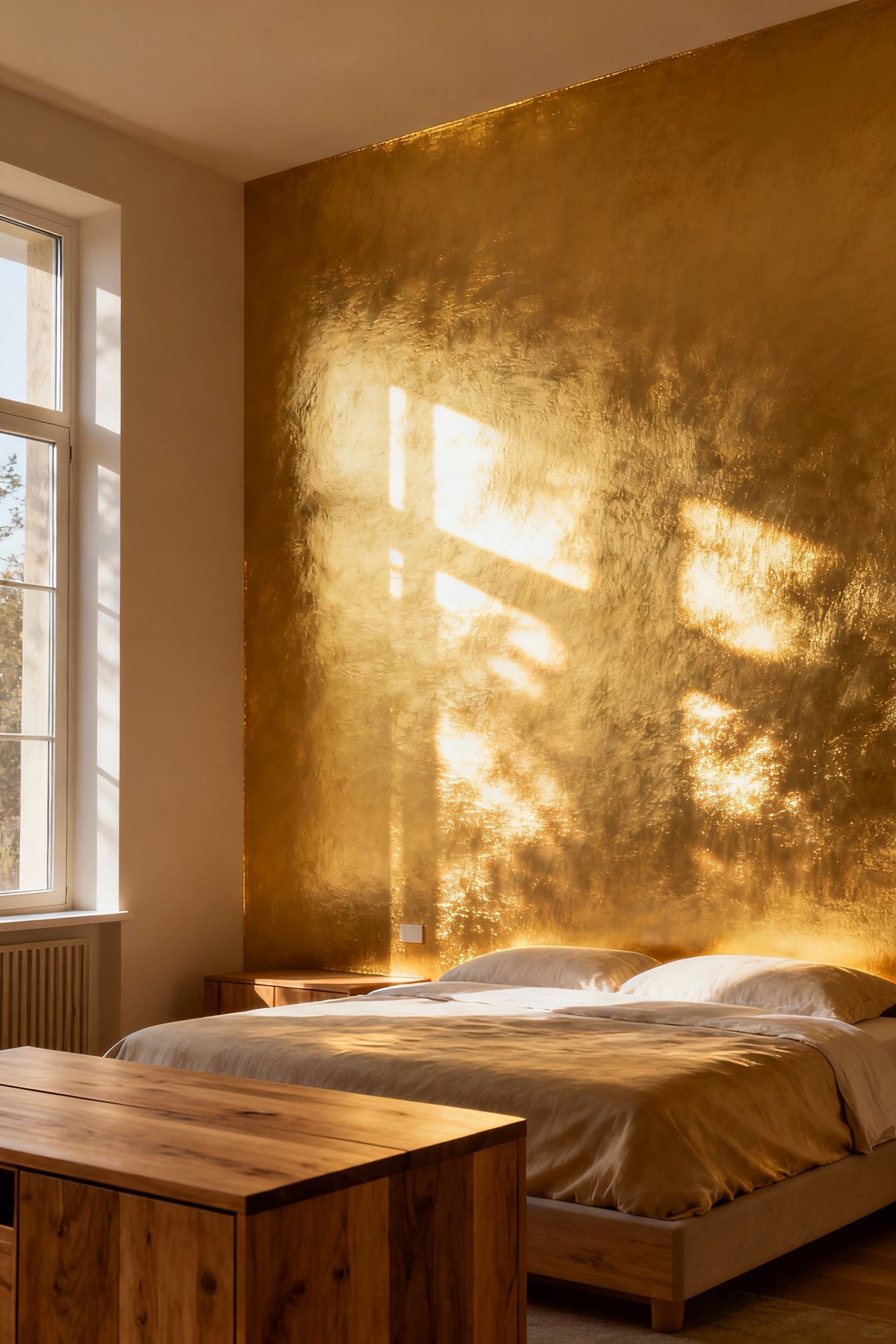
Imagine a soft, mutable wallpaper on the wall opposite your window. As the sun moves across the sky, the wall will subtly shift and shimmer, adding a layer of quiet animation to the room. It’s an elegant way to bring a dynamic, reflective quality to your space without introducing any visual clutter. This gentle play of light can make a room feel more expansive and ethereal, a perfect atmosphere for a tranquil retreat.
Our sense of peace is deeply connected to the sounds around us. A truly serene bedroom isn’t just visually calm; it’s also sonically calm. Thick, textile-based wallpapers, such as those made from felt, wool, or densely woven fabrics, have a remarkable ability to absorb sound. They can soften echoes within the room and help muffle ambient noise from outside, creating a palpable sense of quiet.
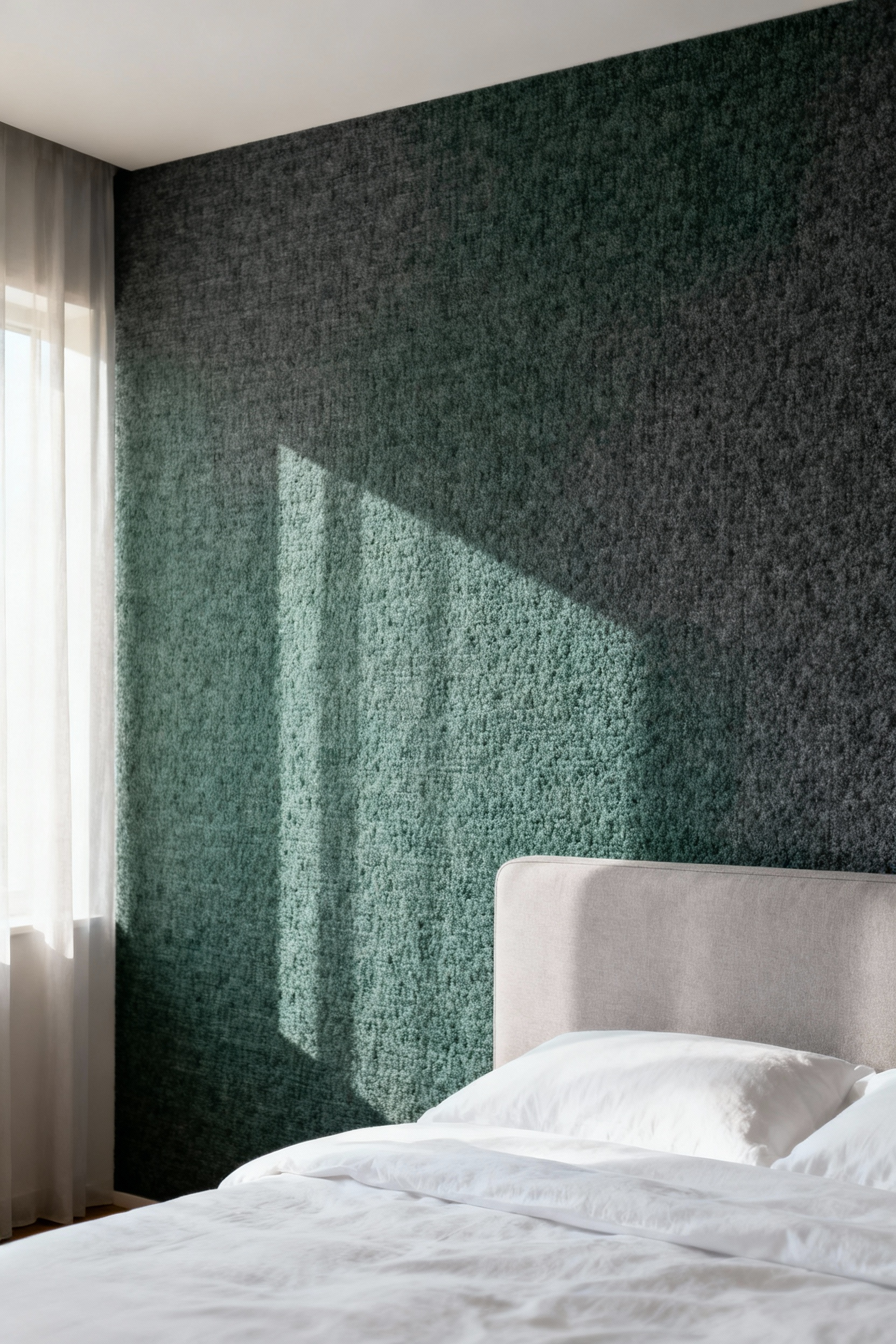
This is one of those subtle details that makes a profound difference in the quality of your rest. What I often find in designing meditation rooms is that creating a “hushed” environment is paramount. By cladding the walls in an acoustically absorbent material, you are effectively wrapping the room in a blanket of quiet. This transforms the space into a true sanctuary, a place where outside disturbances fade away and you can connect with your own inner stillness.
Continuing our journey into the sensory, we now look at how technology and artistry combine to create surfaces that tell a story through touch. These are the details that elevate a space from beautiful to unforgettable, creating a rich, multi-layered experience of home.
Beyond natural textures, there is a world of sophisticated surfaces that bring depth through their very structure. Embossed wallpapers, with their raised patterns, create a beautiful play of light and shadow, adding architectural interest to a wall without needing color or a bold print. The effect can be as subtle as a fine linen weave or as sculptural as a botanical relief, inviting you to run your hand across the surface.
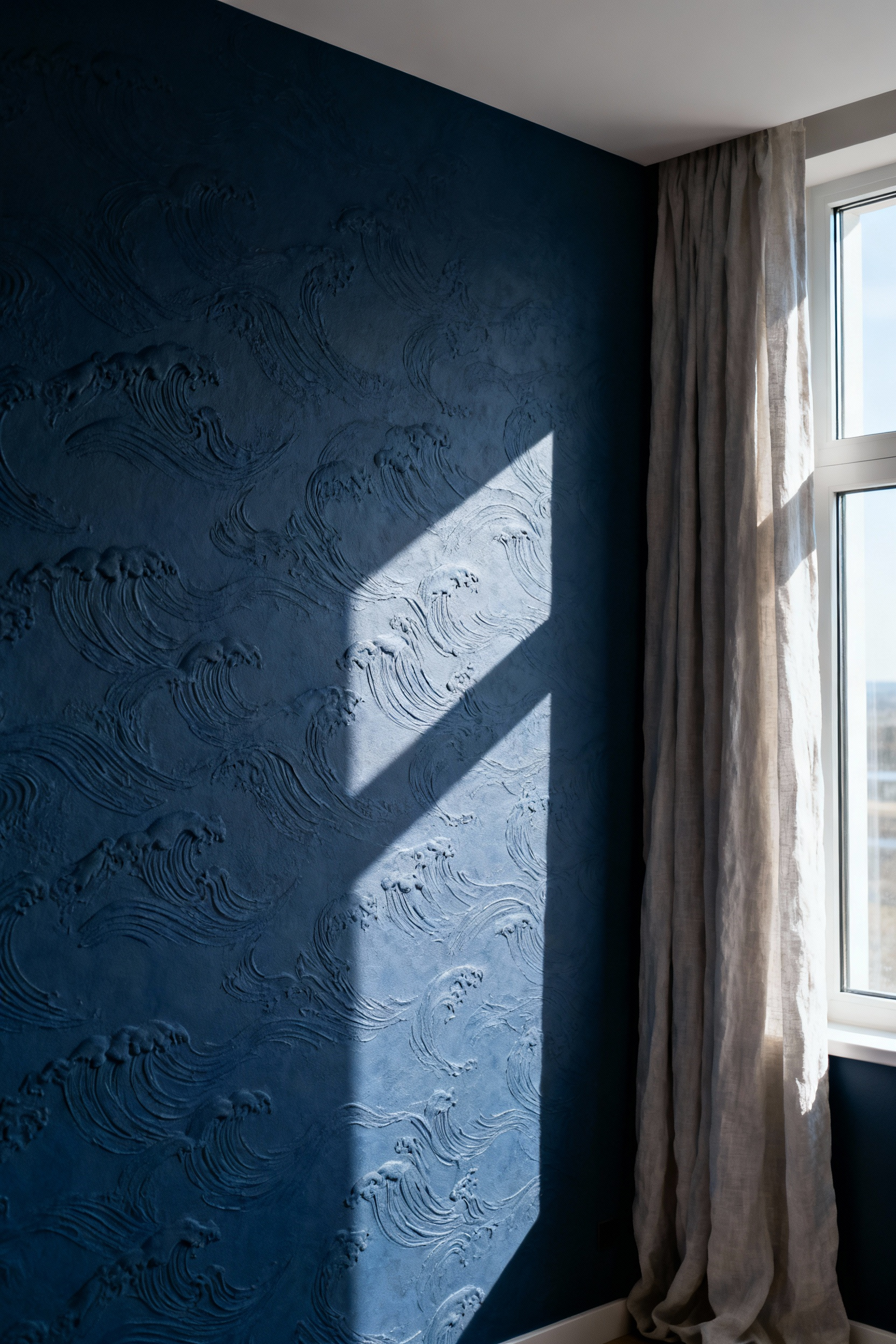
Flocked wallpapers offer an even richer tactile experience. The application of tiny fibers creates a velvety, plush surface that feels incredibly luxurious and comforting. Its true power, however, lies in its ability to absorb both light and sound. The soft, velvety texture swallows harsh reflections and quiets a room, creating an atmosphere of deep, restful intimacy. It’s a wonderful choice for the wall behind a headboard, fostering a sense of being completely and peacefully enveloped.
Now that we’ve explored what to choose, let’s turn to how to apply it. The way you use wallpaper can be as powerful as the pattern itself. It’s a tool to sculpt space, frame views, and create a thoughtful dialogue with the architecture of your room.
A feature wall should be more than just an accent; it should be an anchor for the room’s entire story. Typically placed behind the bed, it’s the first thing you see when you enter and the last thing you see before you close your eyes. This is your opportunity to choose a wallpaper that is a true work of art—a hand-painted mural, a deeply textured grasscloth, or a pattern that holds special personal meaning.
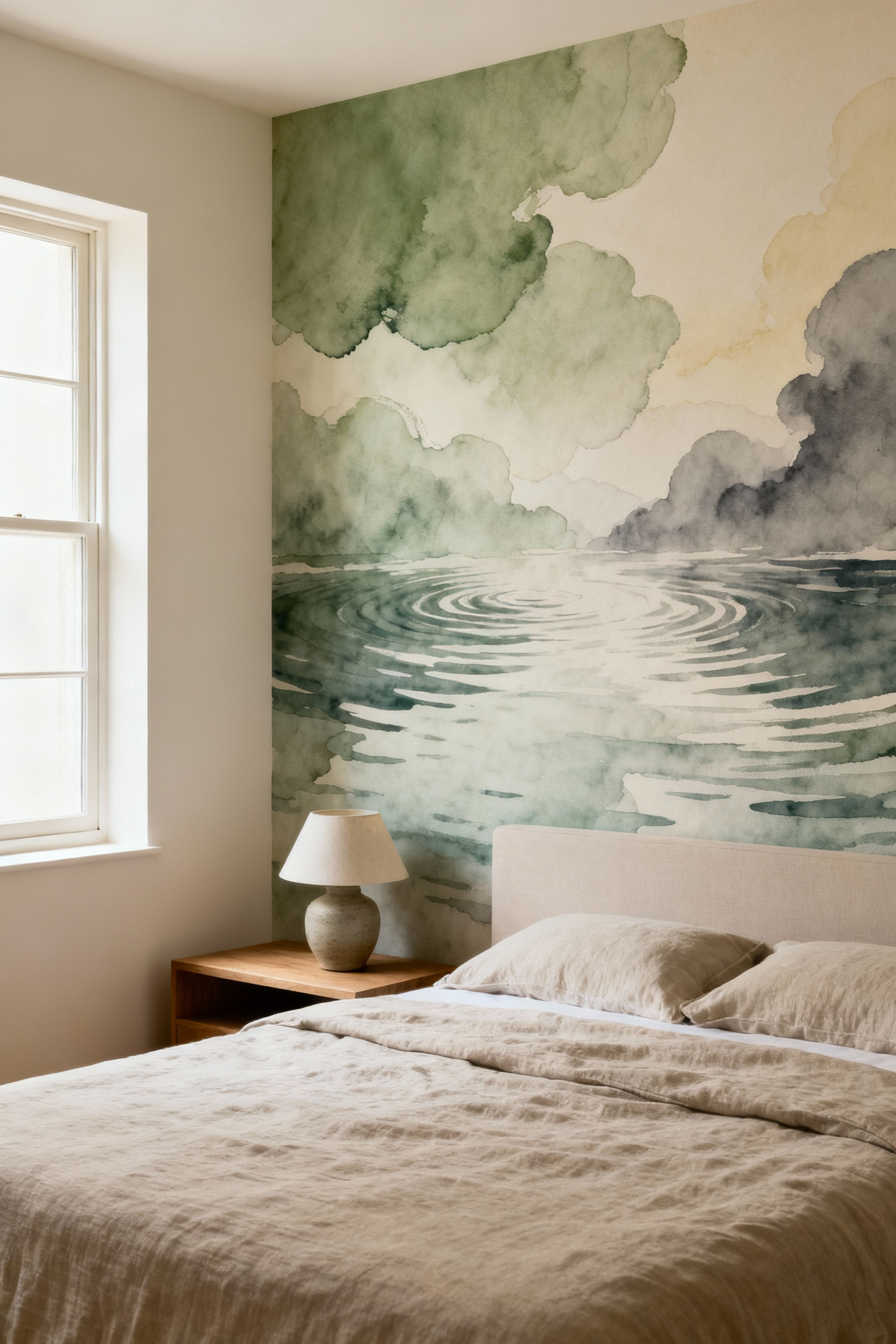
The key is intentionality. A feature wall provides a clear focal point, preventing the eye from wandering restlessly. It grounds the space and gives it a heart. By focusing the room’s narrative energy on a single, beautiful surface, you create a sense of deliberate calm. You’re telling your senses, “This is the center. Rest here.”
We so often forget to look up. The ceiling—our fifth wall—offers a magnificent and underused canvas for creating a truly immersive sanctuary. Wallpapering the ceiling can feel like sleeping under a canopy of stars, a gentle sky, or a piece of abstract art. It’s an incredibly powerful way to make a room feel completely enveloping and utterly unique.
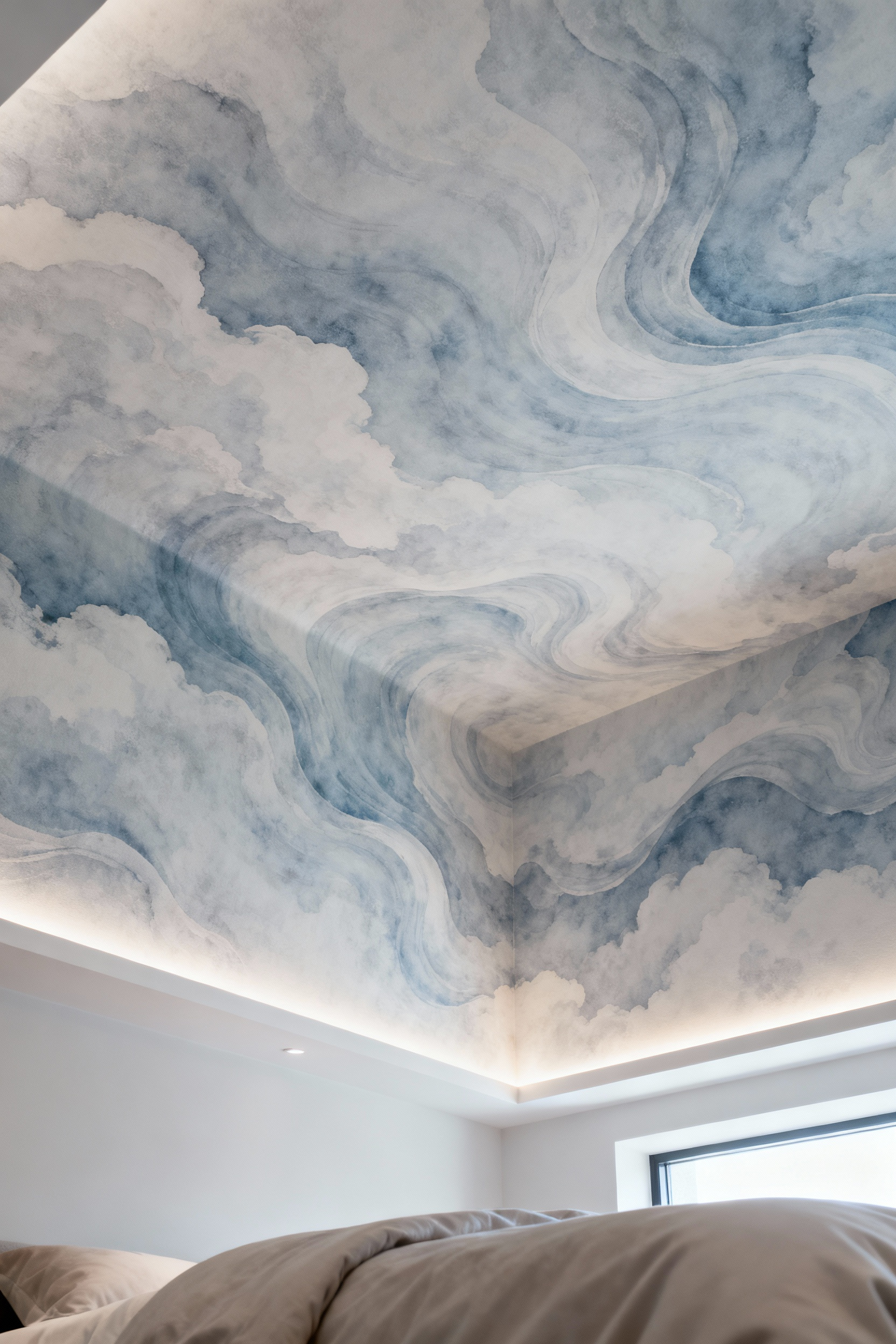
One thing I’ve noticed over years of mindful design is that the ceiling is the first surface we see upon waking and the last we see before drifting to sleep. What a profound opportunity that is. Imagine opening your eyes to a soft, cloud-like pattern or a subtle, shimmering texture that catches the morning light. Instead of a blank void, the ceiling becomes a source of gentle beauty, setting a peaceful tone for your entire day.
Masterful design doesn’t fight the architecture of a room; it works with it. Wallpaper can be used to accentuate beautiful details or creatively solve awkward ones. Have a small, recessed alcove? Turn it into a jewel box by lining it with a rich, dark wallpaper. A wall with classic paneling? Enhance its elegance by filling the panels with a delicate silk or a subtle damask.
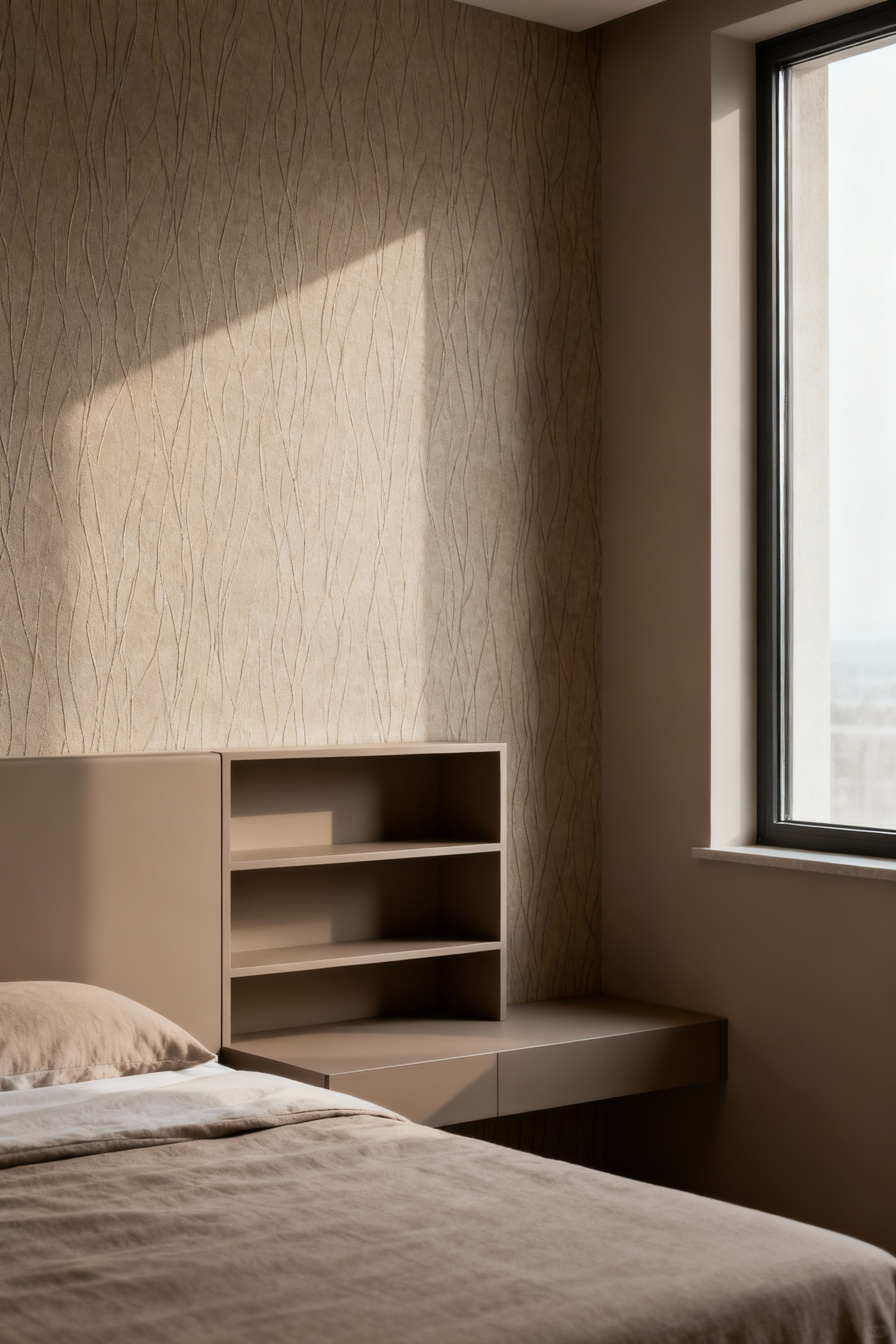
This approach creates a space that feels deeply considered and custom-crafted. The wallpaper isn’t just applied to the room; it becomes part of its very structure. By engaging in this dialogue with your room’s inherent lines, you create a seamless and harmonious environment where every detail feels purposeful and balanced.
Sometimes, the most powerful statement is one of restraint. True serenity requires room to breathe—what we call negative space. Not every wall needs to be covered. In fact, a small, thoughtful application of a beautiful wallpaper can have more impact than covering an entire room. This might mean wallpapering only the back of a bookshelf, the inside of a closet, or a single panel behind a piece of art.
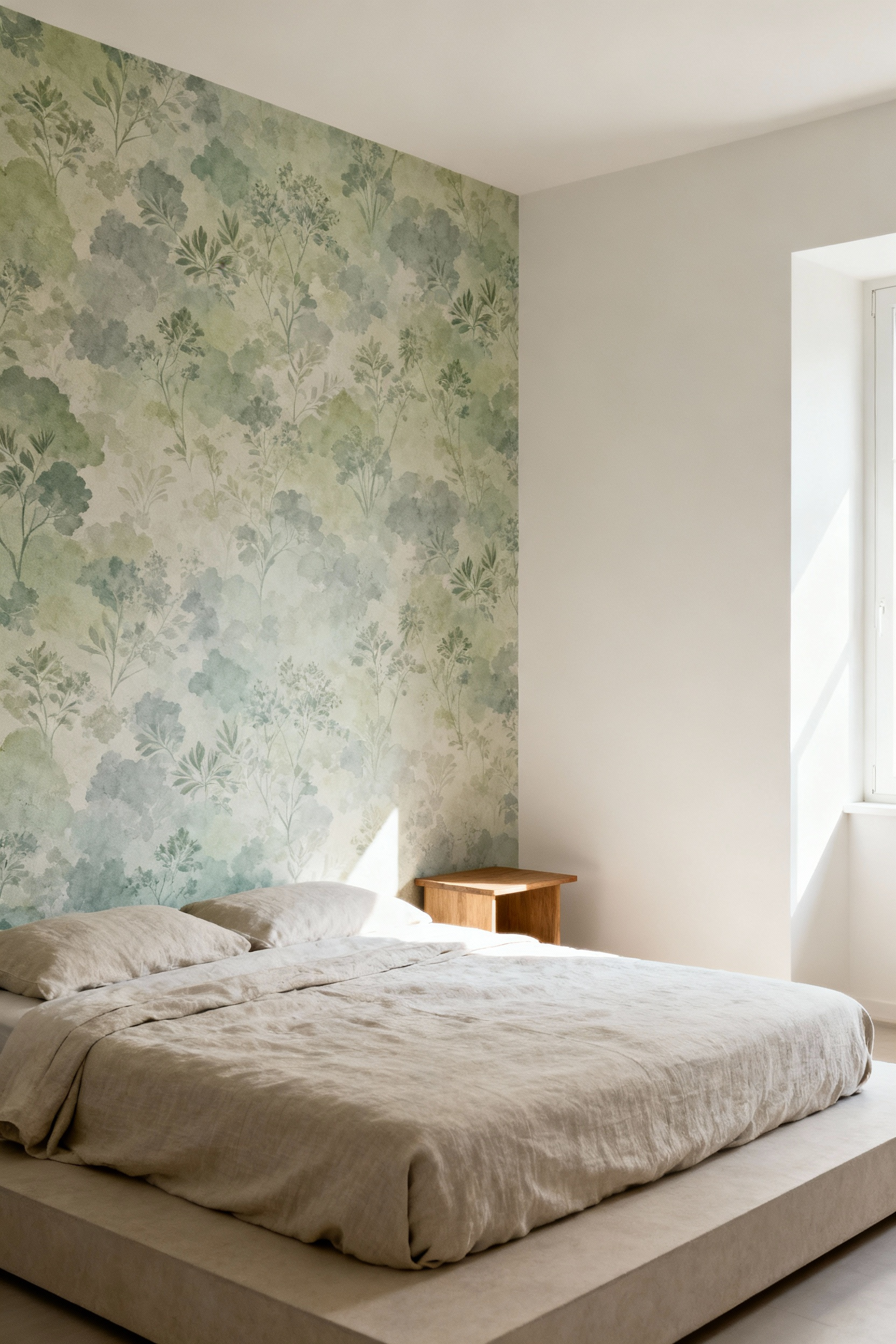
This practice of restrained application honors the need for visual rest. It allows you to introduce pattern and texture without creating a feeling of sensory overload, which can be disruptive to a calm state of mind. By balancing an area of beautiful detail with expanses of quiet simplicity, you create a sophisticated rhythm within the room, inviting the mind to relax and settle.
As our private spaces become more fluid—flowing from bedroom to bathroom to closet—the way we define these transitions becomes a key element of serene design. It’s about creating a cohesive journey, not a series of disconnected rooms.
The journey from your bedroom into an en suite bathroom or a walk-in closet should feel like a graceful, continuous flow. An abrupt change in design can be visually jarring and interrupt the sense of being in a single, cohesive sanctuary. A beautiful way to handle this is by using wallpapers that speak to each other across the threshold. They don’t have to be identical, but they should share a common thread—perhaps a color, a textural quality, or a thematic element.
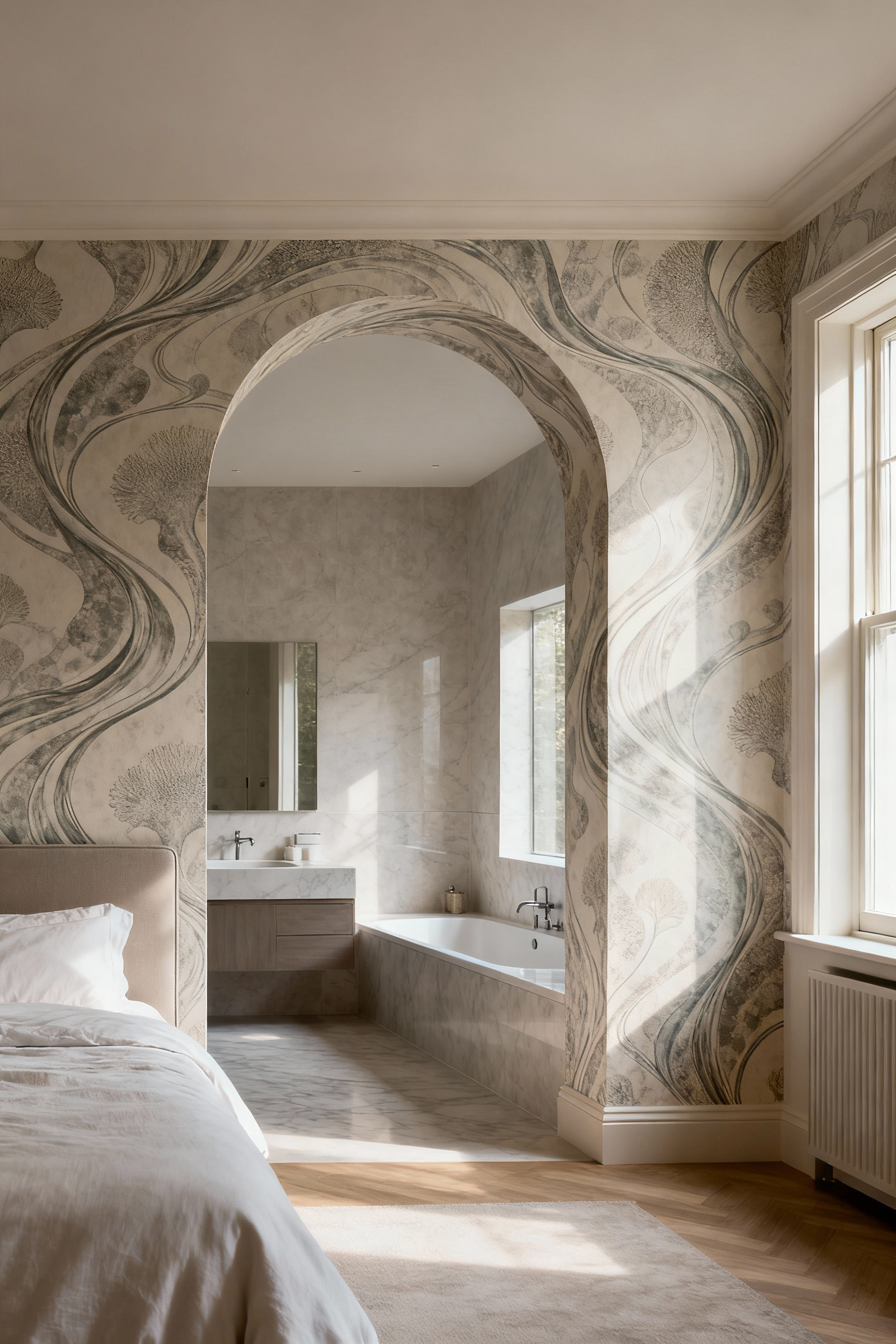
In my own work, especially when designing suites that include a meditation nook adjacent to the bedroom, this transition is crucial. You could use a subtle botanical in the bedroom, and then a simpler, coordinating texture in the same color palette for the nook. This creates a gentle visual signal that you are moving into a slightly different, yet related, zone. It’s an unspoken cue that guides you from one state of being to another with seamless elegance.
A truly mindful space is not static. It supports you through life’s changes, reflecting who you are and who you are becoming. This is about choosing designs that are not just beautiful today, but that will continue to resonate and nurture you for years to come.
A master bedroom can become a living document of your life’s journey. Choose patterns that echo a cherished memory, a meaningful place, or a deeply held aspiration. By surrounding yourself with these visual cues, you create a space that offers not just physical comfort but profound emotional resonance. It becomes a room that knows you, one that silently affirms your unique story.
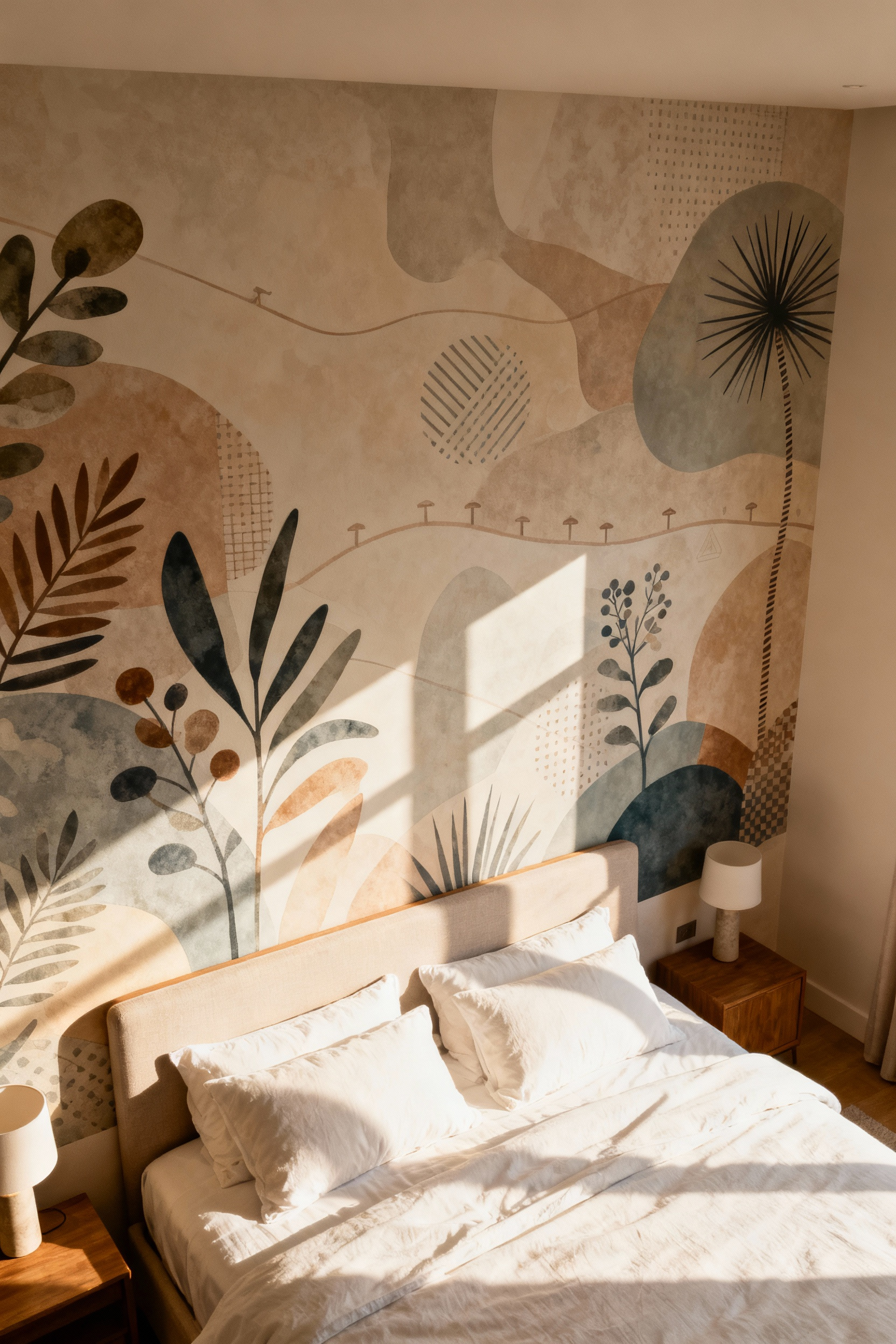
This deep connection is what transforms a house into a home. When the walls around you reflect your inner world, you feel an unparalleled sense of belonging and peace. Every glance at the wallpaper becomes a small, private moment of remembrance or inspiration, grounding you in your own story and creating a sanctuary that is truly and completely your own.
“Future-proofing” in mindful design isn’t about chasing timeless trends. It’s about choosing a backdrop that is serene and versatile enough to evolve with you. This means selecting wallpapers with classic textures, subtle patterns, and muted, foundational colors that won’t feel dated in a few years. Think of a sophisticated grasscloth, a fine linen weave, or a tone-on-tone geometric.
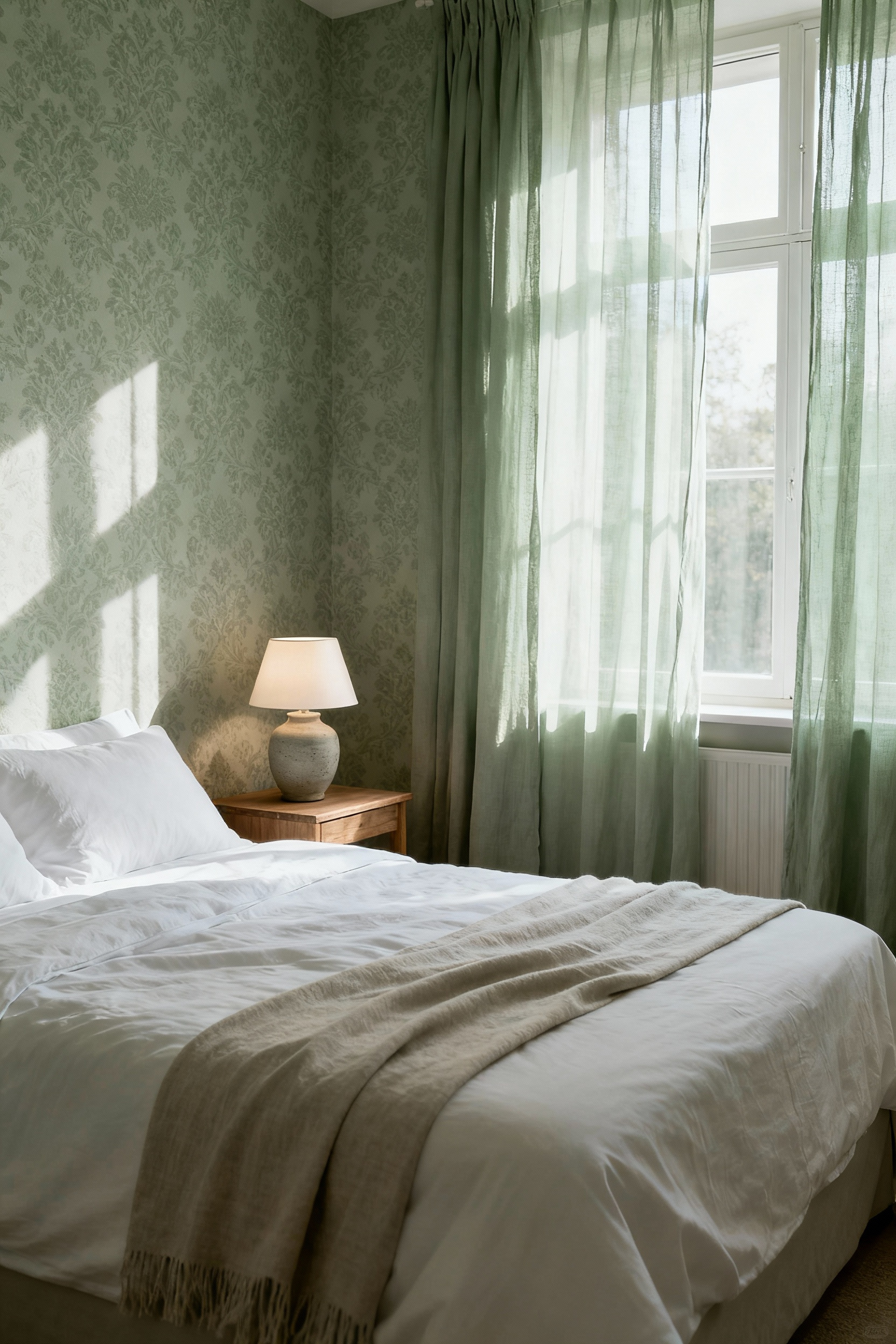
What I tell my clients is to choose a wallpaper that allows their inner life to be the main event. A quiet, elegant backdrop gives you the freedom to change your art, your bedding, and your accessories as your tastes shift, without ever clashing with your environment. It’s an investment in enduring peace, creating a sanctuary that gracefully adapts to the beautiful unfolding of your life.
Our bodies are profoundly affected by light. The right wallpaper can actually support your natural sleep-wake cycle, or circadian rhythm. In the bedroom, this means choosing colors and finishes that promote rest in the evening and gentle awakening in the morning. Matte finishes that absorb light are more calming than reflective ones, and muted, cool tones—like soft blues, grays, and greens—are known to have a soothing effect on the nervous system.
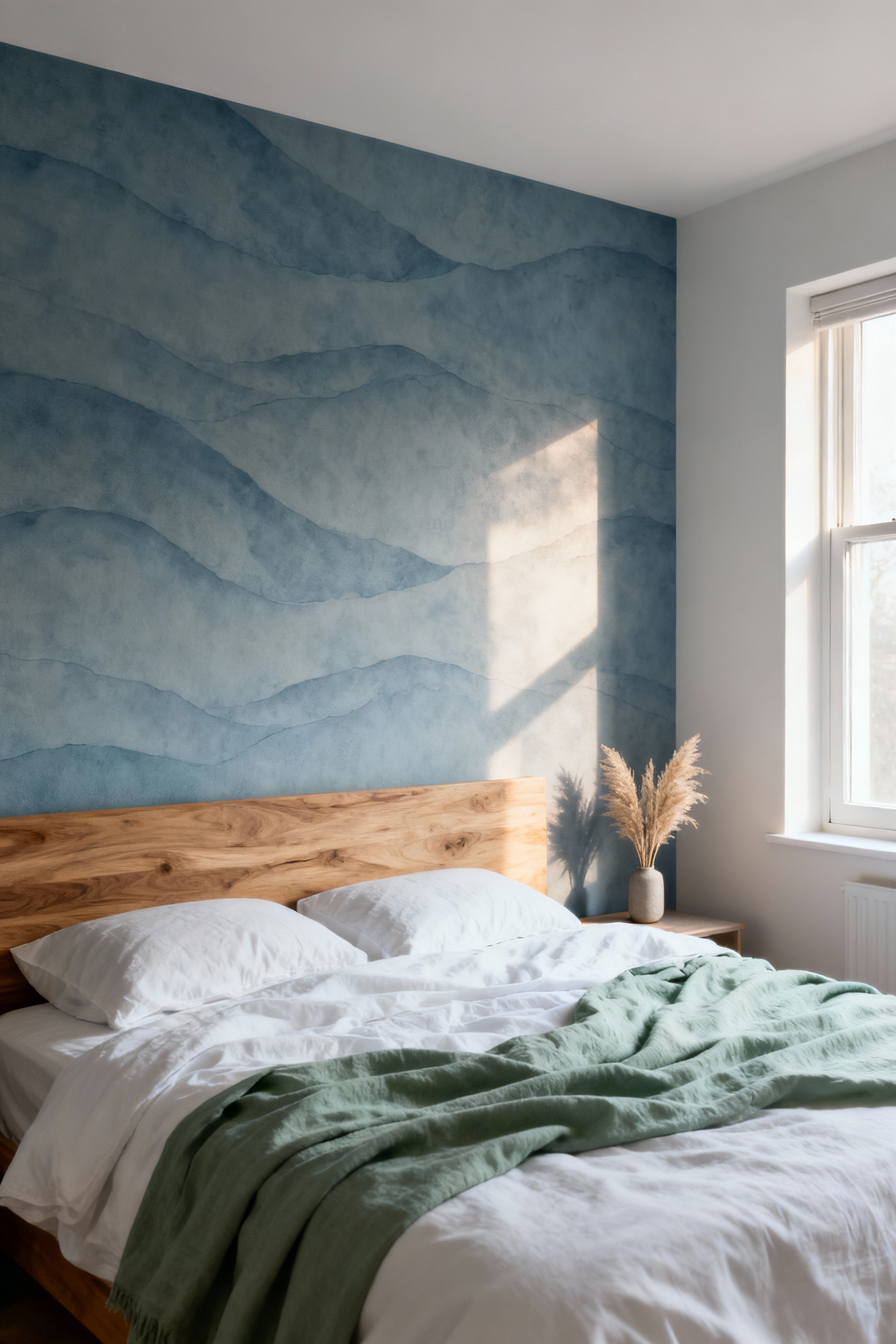
Avoid highly stimulating colors or busy patterns in your direct line of sight from the bed. The goal is to create a soft, enveloping atmosphere that signals to your body it’s time to wind down. By designing in harmony with your biology, you turn your bedroom into an active partner in your health and well-being, supporting deep, restorative sleep night after night.
Every visual detail matters. The scale and repetition of a pattern have a subtle but powerful psychological impact. A small, densely repeated pattern can create a cozy, intimate feeling, while a large-scale, expansive mural can make a room feel more open and majestic. An orderly, uniform repeat can bring a sense of calm structure, whereas a more organic, irregular pattern feels more dynamic and free-flowing.
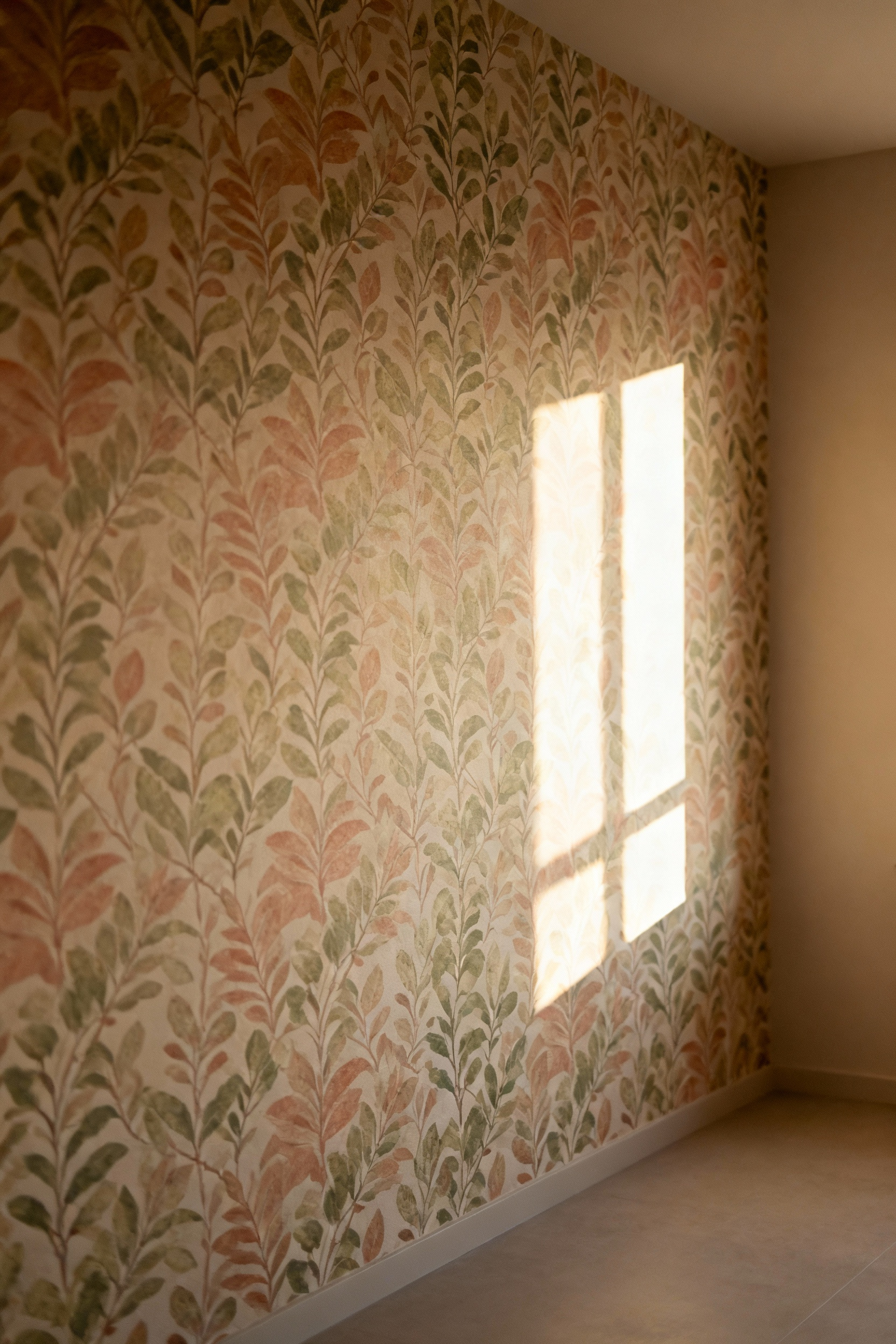
There is no right or wrong choice here; it’s about calibrating the visual energy of the room to support your personal needs. Do you crave a sense of cozy enclosure, or do you need to feel a sense of boundless serenity? Paying attention to these micro-aesthetics allows you to fine-tune your environment, creating a space that is not just beautiful but psychologically resonant.
We conclude by looking at one of the most vital elements in any room: light. A space is only as serene as the light that fills it, and our final consideration is how wallpaper can become an active participant in illuminating your sanctuary.
Natural light is life force. In a master bedroom, maximizing this vital energy can have a profound impact on your sense of well-being. A sophisticated way to achieve this is through the subtle integration of metallic finishes in your wallpaper. We’re not talking about overt glitter, but a soft, pearlescent sheen or a brushed bronze thread that gently catches and diffuses the light. This acts as a quiet amplifier, making the entire room feel brighter and more expansive.
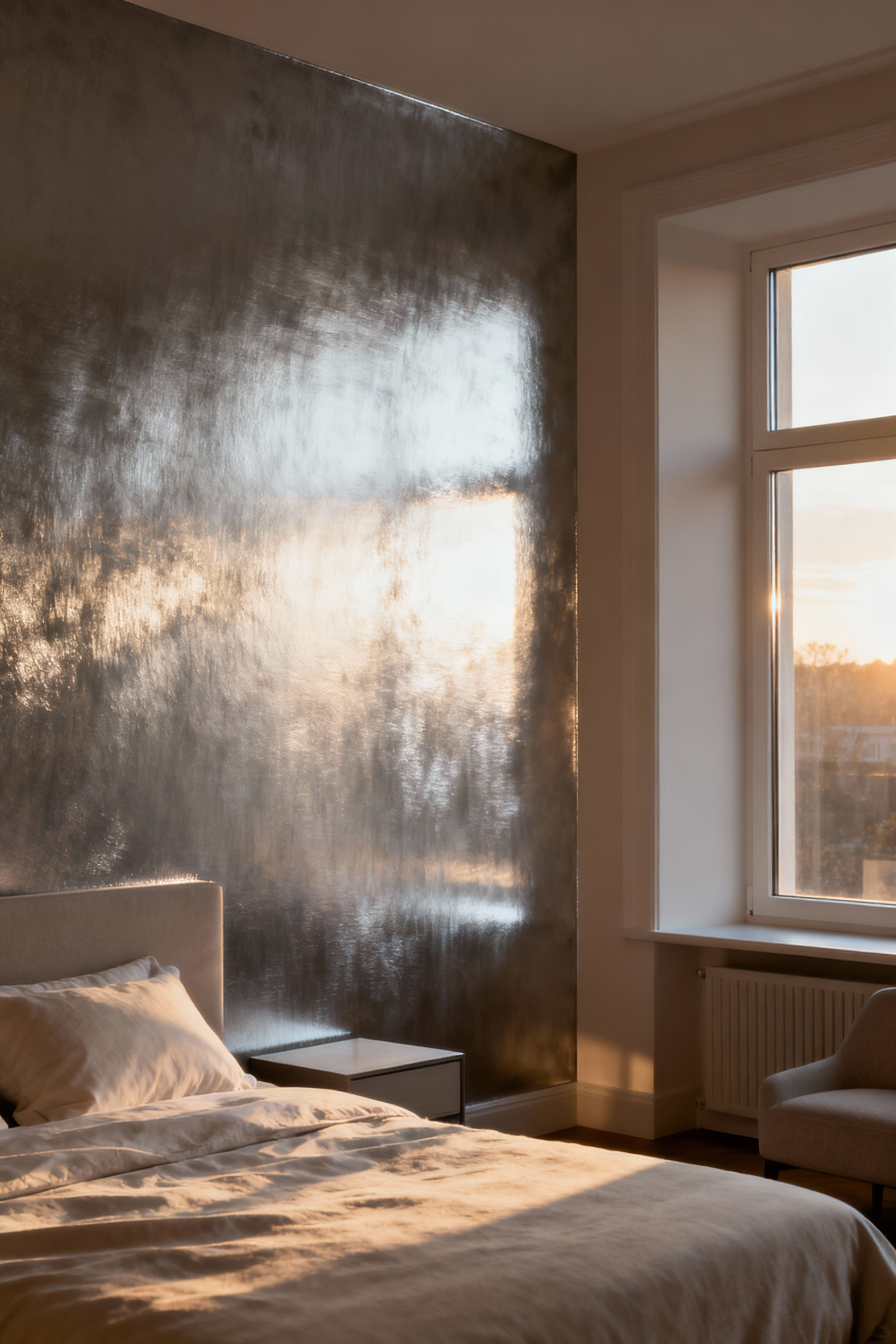
I’ve seen this play out beautifully in urban apartments where natural light is a precious commodity. A wallpaper with a subtle metallic element on the wall opposite a window can completely transform the feeling of the space, bouncing light into dimmer corners and making the room feel more alive and airy. It is a simple, elegant way to harness the beauty that is already there, creating a sanctuary that feels filled with a soft, natural radiance.
As we conclude this exploration, it’s clear that choosing a wallpaper for your master bedroom is so much more than a decorative decision. It is an act of intention. From the grounding energy of a natural grasscloth to the personal story told by a custom mural, each of these bedroom wallpaper ideas master a single, vital principle: that our environment is a reflection of our inner world, and a powerful tool for shaping it. Your walls can become a source of comfort, a quiet companion on your journey to well-being.
The truest guidance I can offer is to listen to your own inner voice. What textures feel calming to you? What patterns bring you a sense of peace? Allow your intuition to guide you toward a choice that resonates not with a trend, but with your soul. By doing so, you are not just designing a room; you are authoring a sanctuary. You are creating a space that will hold you, nurture you, and consistently remind you of the beauty and tranquility that reside within.